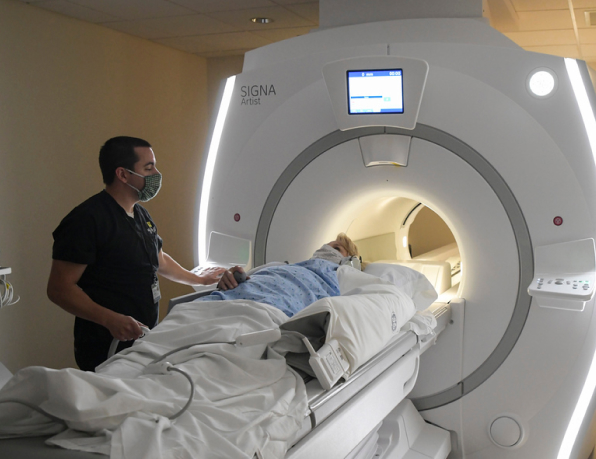MRI (Magnetic Resonance Imaging)

Overview
If you have an MRI scheduled, you may have many questions.
An MRI can help your doctors diagnose certain diseases or injuries and allow them to monitor how well you have responded to treatment. You may need an MRI if your CT scan or X-ray doesn’t provide your doctor with enough information about your condition.
- We offer patients sleep masks to help them avoid seeing the MRI during their exam.
- We allow patients to have screened family members go into the exam room with them during their scan.
- In many cases we can offer you music to listen to during the MRI to help you feel comfortable.
- You can always ask your healthcare provider to prescribe an anti-anxiety medication before the exam and see if you would be a suitable candidate for anesthesia.
- We will give you an emergency squeeze ball to hold in your hand to press if you feel scared or uncomfortable at any point during your MRI.
Safety is our highest priority. The St. Luke’s staff verbally screens all patients again to ensure all screening questions are fully understood.
If your clothing has even a small amount of metal on or in it, there is a possibility of injury. Additionally, the smallest amount of metal can distort the MRI image, even if it is away from the area being imaged.
If your doctor ordered the contrast for your exam, he or she feels it will be helpful for your specific symptoms. You can refuse the contrast, but it may limit the exam.
Exams can vary from 20 minutes to one hour depending on what you are having imaged. To better answer this question, please contact us.
Prior exams are always helpful for comparative purposes. If an abnormality was present on the prior exam, your radiologist will be able to make a better diagnosis based on the rate of change, if any, from the prior exam.
Breast MRIs: A vital tool for early detection
Breast MRIs offer a highly sensitive imaging technique that can detect subtle changes in breast tissue, often earlier than traditional mammograms. This advanced technology is particularly beneficial for women with dense breast tissue, which can make mammograms less effective.
If you're at high risk for breast cancer or have concerns about your breast health, talk to your doctor about whether a breast MRI is right for you.
